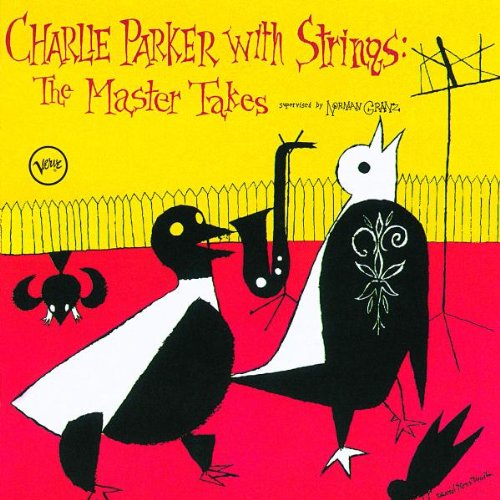Recent listening, current
Archived listening, 2013-2016
Showing posts with label 1952. Show all posts
Showing posts with label 1952. Show all posts
Wednesday, September 4, 2013
130. Charlie Parker / Charlie Parker with Strings: The Master Takes (1995)
If you're only interested in Bird's famous recordings with a small orchestra, then you can save a little coin with this attractive disc. (It's only fair to say that for just a few extra bucks, $20 on average for used, you can have all the material here plus much more and better liner notes if you buy the Complete Verve Masters.) But as this disc's title indicates, it contains the complete master takes of Bird's famous 1950 sessions with strings. In addition to the 14 tracks contained on the original two LPs by Mercury, the Verve CD contains 10 bonus tracks recorded 1947-1952. The orchestral numbers are all standards, and when they work, it's magic. Some have argued that this was a commercial sell out. It was so successful that it led to a flood of other artists playing with strings. The truth is that Parker himself always wanted to play with an orchestra, and these recordings fulfilled his dream. In the greater context of jazz today, I think it's a stale argument and intentions don't matter. Who cares whose idea it was? Hey, it's Bird, there's some extra musicians, and the result is warm, elegant, and hard to turn off. Whoever can't enjoy such an engagement must be difficult to please. Likewise are my feelings for Cliff Brown, Dizzy, or anybody else who went in the studio with an orchestra in the 1950s.
Labels:
1947,
1948,
1949,
1950,
1951,
1952,
bebop,
bop,
charlie parker,
charlie parker with strings the complete master takes,
mercury,
orchestra,
review,
tenor sax,
tenor saxophone,
verve
Saturday, February 23, 2013
42. Lester Young with the Oscar Peterson Trio (1952)
For the most part, this disc is all about Lester, who performs admirably but is noticeably shakier and lacks that bright, bursting energy he exhibited a few years earlier. He frequents the lower register in soft, emotionally inflected lines that give the ballads a uniquely personal treatment. It's unmistakably Lester on every track and there is some very keen playing ("I'm Confessin' (That I Love You)" is just one example, or a close approximation of the man we once knew in "Just You, Just Me") but in other places I hear him struggle with timing and the impact of the inventiveness is lost. The dramatic ascents and nose dives he used to do so well seem to sputter like an injured bird, rather than a stunt pilot. Young usually takes the first chorus, and sometimes afterwards I swear I can hear Peterson and Kessel emulating his style on their instruments, playing several "even" bars before throwing the rhythmic weight of the next phrase off to one side and rushing in after it. Even if he isn't in the same form as the recordings from 1946-1949, he's still Lester Young and when it works, it's untouchable.
Sunday, February 17, 2013
37. Duke Ellington / Ellington Uptown (1952)
It seems like Ellington Uptown gets short shrift, which could put off a listener who hasn't heard it. It really needs another look because it's an excellent album, and the orchestration and arrangements are especially good. Duke's work is like pizza: when it's good it's great and when it's bad... well, was it ever bad? Be honest. Even when it wasn't that great, it was still better than most everything else. By comparison, I think some of Duke's legacy is unfairly praised. All the "three minute masterpieces" are cracking good sides, but they're not all on the same level, and so the mediocre ones are elevated to a higher status partly by association and partly by critics who haven't listened to them all. Yet Duke's work from the 1950's languishes in the shadows, right at the moment when his famous soloists had matured and were really hitting a stride. With that in mind, this set swings really hard and practically lifts you off the floor. The arrangements are the full-length concert arrangements, closer to what the band was doing on stage rather than something they cooked up just for the record. There's even a live cut ("Skin Deep") with a famous drum solo by Louie Bellson. My favorite moment, on an album filled with favorite moments, is listening to Betty Roche sing "Take the 'A' Train." She had such a fun and playful style, like improvising a scat vocal that self consciously stabs at bebop. I love it when she sings her last line and leans off the microphone as the massed band blows in behind her. It sounds like the girl is falling backwards into an approaching tidal wave. So enjoy these chestnuts, which may be another example of Duke reinterpreting his back catalog, but are also a darned good example of what this band was all about.
Labels:
1952,
album,
betty roche,
big band,
duke ellington,
ellington uptown,
jazz,
piano,
review,
swing,
vocal,
vocalist
Subscribe to:
Posts (Atom)


